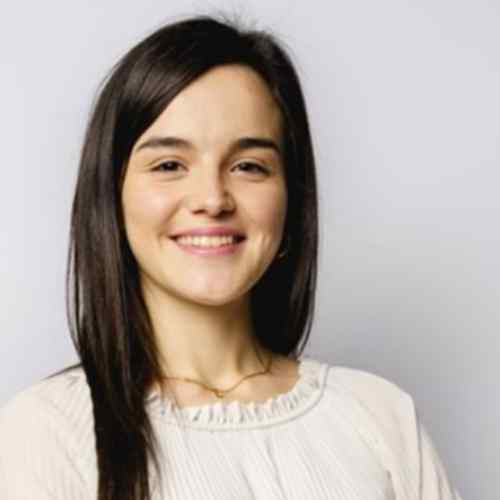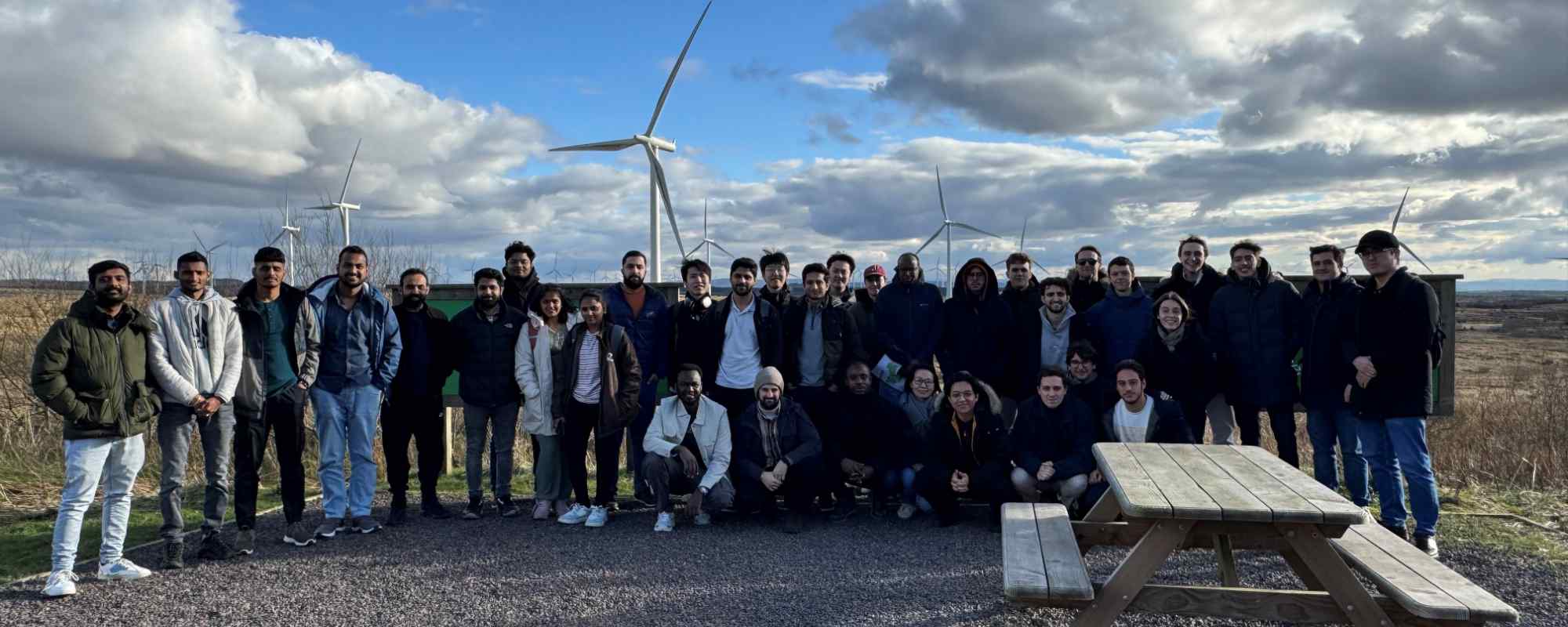MSc Smart Grids with the Comillas Pontifical University, Madrid
ApplyKey facts
- Start date: September
- Study mode and duration: 12 months full-time
Industry links: paid internships
Study with us
This specialist MSc course will enable you to:
- earn a double degree with global impact – delivered in partnership with Comillas Pontifical University, Madrid and leading international energy providers
- gain practical experience through paid industrial internships in the UK and Spain
- develop advanced expertise in the digital transformation of power systems, from energy storage to smart grids.
- learn how to realise resilient, efficient and sustainable power networks that integrate renewables and enable the energy transition to net-zero
The Place of Useful Learning
UK University of the Year
Daily Mail University of the Year Awards 2026
Scottish University of the Year
The Sunday Times' Good University Guide 2026
Why this course
This MSc responds to the growing demand for engineers who can lead the digitalisation of the electric grid. Delivered in partnership by the ICAI School of Engineering, Comillas Pontifical University, Madrid, the Department of Electronic & Electrical Engineering, University of Strathclyde, and industry partners, Iberdrola, Minsait/Indra and UFD Distribución Electricidad S.A, it is designed specifically for graduates in electrical, electronic, or telecommunications engineering.
Whether you're an electrical engineer looking to deepen your expertise in smart grids and renewable integration or an information and communications engineer seeking to understand the power sector’s emerging needs, this course will equip you with the knowledge and skills to contribute to the new energy paradigm and the utility of the future.
You’ll master the design of modern energy systems, their role in a global context, and the emerging digitalisation tools that are enabling the transformation. From smart grids to energy storage, and from data analytics and AI to cybersecurity, you will discover how technological innovation is reshaping the energy landscape and learn how to apply digital tools and data-driven strategies to modernise infrastructure and improve system performance.
A truly international experience
As part of the MSc, you’ll gain extensive international and industrial exposure.
You’ll spend one term in the ICAI School of Engineering at the Comillas Pontifical Universidad, Spain and one term in the Department of Electronic & Electrical Engineering at the University of Strathclyde, Scotland.
These are then followed by one term of a paid internship with an industry partner, either Iberdrola, ScottishPower, Minsait/Indra or UFD Dstribuction Electricidad S.A. at their branch offices in Spain or in the UK.
This course structure ensures you graduate with two qualifications, academic excellence and a global perspective on the energy sector.
Here from students now delivering the grid digitalisation in industry - Life as a Smart Grid MSc student.
This MSc gave me advanced technical and practical knowledge on all aspects of power systems. Thanks to the internship and hands-on projects, I was able to apply what I learned right away. This helped kick-start my career in research in Smart Grids.
MSc Smart Grids graduate
Learn from experts at the forefront of innovation
The academic team includes internationally renowned researchers from both partner institutions, whose expertise spans the full spectrum of smart grid technologies, renewable integration, and energy systems innovation.
Moreover, course students benefit from invited lectures from industry experts (“Smart Talks”) where they share the latest in emerging grid challenges and deployment of new technologies.
Our core industry partner, Iberdrola, plays a central role in the course, offering guaranteed paid internships for course students and providing unique international insight into the evolving role of utilities in the digital energy era.
Strathclyde
- Director: Professor Graeme Burt
- Deputy Director: Dr Bruce Stephen
- Khaled Ahmed (Power Electronics for Transmission & Distribution)
- Safak Bayram (Control & Protection of Future Networks)
- David Harle (5G Communications Networks)
- Qiteng Hong (Control & Protection of Future Networks)
- James Irvine (5G Communications Networks, Cyber Security & Data Privacy)
- Marcin Mrozowski (Hardware IoT Communication System Design)
- Bruce Stephen (Data Analytics & AI for energy systems)
- Robert Stewart (Hardware IoT Communication System Design)
Comillas Pontifical University
Director: Miguel Angel Sanchez Fornie
Coordinator: Carlos Mateo Domingo
- Alonso Alonso, Jesús (Fundamentals of Power Systems)
- Cucala García, Luis (Fundamentals of Telecommunications & Telecommunications for Smart Grids)
- Ojeda Couchoud, Santiago (Leadership, Change Management & Corporate Responsibility)
- Franco Cruzado, Raúl (Leadership, Change Maanagement & Corporate Responsibility)
- García de Amezaga Cuevas, Íñigo (Leadership, Change Management & Corporate Responsibility)
- Sendín Escalona, Alberto (Telecommunications for Smart Grids)
- Batlle López, Carlos (Regulation & New Business Models)
- Rodilla Rodríguez, Pablo (Regulation & New Business Models)
- Troncia, Matteo (Operation & Planning of Future Distribution Networks & Laboratory)
- Chaves Ávila, Jose Pablo (Operation & Planning of Future Distribution Networks)
- González García, Alezeia (Operation & Planning of Future Distribution Networks)
- Mateo Domingo, Carlos (Operation & Planning of Future Distribution Networks & Master Thesis)
What you'll study
You’ll study a selection of taught modules exploring the principles and technologies behind smart grids, including automation, control and communications systems. You will learn how to design and integrate renewable energy sources into modern power systems, ensuring they operate efficiently and sustainably. The course also delves into the role of digital technologies—such as AI, data analytics, and cybersecurity—in optimising and securing energy networks. In addition, you will gain a solid understanding of the economic, regulatory, and policy frameworks that shape energy markets and influence utility operations.
The modules are designed to develop your technical expertise alongside the leadership and professional engineering skills needed to help lead the digitalisation of the electrical network.
MSc Individual Project
Students who pass all required modules will progress to the individual internship-based project undertaken between May and August. This involves an in-depth investigation into a core area within the electrical power and energy domains, working with industry teams and supported by an academic supervisor. Projects are typically conducted as a paid internship with either Iberdrola, ScottishPower, Minsiat/Indra or UFD Distribucion Electricidad S.A. at their offices in Spain or the UK.
This course structure ensures that you graduate with not only academic knowledge but also practical experience and industry insight.
Studied at ICAI School of Engineering, Comillas Pontifical University, Madrid, Spain.
Operation and Planning of Future Distribution Networks (15 credits)
The aim of this course is to develop an understanding of the principles and main methodologies behind the planning and operation of distribution networks, understand how distributed energy resources affect these activities, and comprehend what technical solutions distribution grid operators need to deploy in order to address the new challenges of the Smart Grid.
Regulation and New Business Models (15 credits)
The course presents an in-depth interdisciplinary perspective of the electric power sector, with regulation as the core for networks business providing the link among the engineering, economic, legal and environmental viewpoints.
Telecommunications for Smart Grids (15 credits)
The aim of this course is to provide the student with knowledge about the main technologies and standards used for digital communications. More precisely, the course is focused on technologies that are or could be useful in present and future Smart Grids, respectively. Contents will vary from a mathematical model of the signal transmission to a higher-level view of the network architecture for Smart Grid Networks. Cybersecurity will be a recurrent topic in this course.
Leadership, Change Management & Corporate Responsibility (9 credits)
This course provides skills and knowledge necessary to manage staff in dynamic company structures, which are subject to changes and difficulties as part of a more complex organization. In addition to this, the course addresses situations which encompass dilemmas and implications of an ethical and professional nature, which will not only affect students in their future personal or professional life, but also have consequences that go beyond their own personal lives.
AND Either
Fundamentals of Power Systems (6 credits)
The aim of this course is to provide the student with the fundamental foundations on power systems that allow them to tackle more advanced concepts.
Or
Fundamentals of Telecommunications (6 credits)
The objective of this course is to develop some basic understanding of the fundamental foundations on telecommunication. The course focuses not only on the transmissions systems and techniques used nowadays for transmitting information at a high level but it also elaborates on the fundamental concepts of signal modulation and propagation.
Detailed information on these modules is available at the Comillas Pontifical University.
Studied at the Department of Electronic & Electrical Engineering, University of Strathclyde, Glasgow, Scotland.
Control and Protection of Future Networks (10 credits)
HVDC transmission systems and renewable generation units use power electronic converters rather than synchronous machines to interface to the AC network. Hence, classic control and protection methods meant for classic power systems may not be able to accommodate high penetration of renewables and long distance HVDC links.
The aim of this module is to enable students to appreciate the principles of control and protection of present-day and future electrical systems including:
- The steady-state and dynamic analysis of electrical systems under normal, transient and fault conditions.
- Grid-codes and other legislation that impacts upon the functional requirements of protection systems, generation and HVDC transmission units.
- The main concepts related to the requirements, functions, design and operation of protection schemes for power system transmission and distribution systems.
- How HVDC and converter-interfaced generation pose challenges to operation and protection system design; but also, how their enhanced controllability has great potential to enable new alternative concepts.
Hardware IoT Communication System Design (10 credits)
This module will provide you with the essential skills to design, build and test a sensor network for your smart grid application. The course makes use of radio frequency (RF) Internet of Things (IoT) development boards and a range of sensors and radio modules. You'll program the boards to communicate with the sensor nodes and wirelessly transmit data to gateway and onwards to a PC receiver or mobile wi-fi device. You'll analyse the measurement data and produce a graphical user interface to display it in a user-accessible manner.
5G Comms Networks (10 credits)
This module covers the core principles and operation of packet-based communications networks leading to the design and operation of future 5G networks. It describes the operation of the key transport layer protocols within the internet architecture including wired and wireless networks. Specific areas include 5G Quality of Services based networks, techniques to measure and report the network performance and operation.
The course will contain topics in relation to cyber security including browser and HTTP fundamentals, security architecture and security analysis methodologies highlighting common web vulnerabilities, security management systems and policies and security governance.
Cyber Security and Data Privacy (10 credits)
This module provides an insight into the security requirements of power networks, the basic security primitives which can be used to provide protection to these networks, and an understanding of user security and privacy. It covers the application of security processes to power networks and components and also discusses case studies of attacks on industrial networks. In addition to covering different methods of encryption (symmetric and asymmetric), the module covers authentication and data integrity, as well as secure system design and vulnerability and threat assessment, and security standards.
Data Analytics & AI for Energy Systems (10 credits)
A strong part of the business case for smart grids is using intelligence and automation to gain more capacity from existing assets to avoid large expenditure on further assets. Also, autonomy and intelligence is key to the flexible operation of smart girds, integration of low carbon generation and effective interaction with consumers.
This module teaches the key AI and data science methods that are applicable to smart grids, and provides case studies of their application. We are moving to a future where much more can and will be monitored and new techniques, leveraging data analytics, are needed to fully exploit the data. Areas covered will be machine learning, knowledge based methods, distributed intelligence methods and architectures, applications in asset management, applications in network management and control.
Power Electronics for Transmission & Distribution (10 credits)
Power electronics provides one of the key technologies for delivering the flexible power networks necessary for future low carbon energy systems. This module will help to build the skills and knowledge necessary to analyse power electronic-based systems, evaluate their operation within the wider power network, and identify the key advances that will facilitate wider adoption.
In particular, the module will build understanding in the following areas.
- The operation of power electronic-based energy conversion systems
- The application of power electronics to transmission and distribution networks
- The benefits and disadvantages of power electronics in power systems
Paid internship at one of the industry partners branch offices in either Spain or Scotland.
MSc in Smart Grids Individual Project (60 credits)
This will take the form of a practical, applied project that addresses the industry needs with one of the University partners or as a paid internship with Iberdrola, Minsait/Indra, UFD Distribucion Electricidad S.A. and Gridspertise at one of their offices in Spain or the UK.
Students will identify an engineering problem, critically review the existing literature relating to this, formulate a project plan with clear objectives, milestones and deliverables. They will then define and implement one or more methodologies independently, interpret the results and provide a contextual analysis of these, to make sound contributions to solve or address the problem and make recommendations for future work.
Learning & teaching
The MSc offers a truly international experience with extensive industrial exposure. You will study one term in Spain and one term in Scotland.
Classes are delivered through a blended learning approach, combining both in-person and online methods to provide a flexible and engaging educational experience. Teaching methods include:
- lectures (in-person and online)
- problem-solving tutorials
- hands-on, project-based laboratory sessions
- professional workshops
This approach is designed to equip you with advanced technical expertise while also developing essential leadership, project management, and professional engineering skills.
Teaching terms
- Term 1 (September to December) – 60 credits (30 ECT) of taught modules at ICAI School of Engineering, Comillas Pontifical University, Spain. Classes are held Monday to Friday between 3pm to 9pm.
- Term 2 (January to May) – 60 credits (30 ECT) of taught modules at the Department of Electronic & Electrical Engineering, University of Strathclyde, Scotland. Classes are held Monday to Friday, between 9am to 5pm.
- Term 3 (May to August) – 60 credits (30 ECT) through an MSc individual project.
Each module typically includes:
- five hours of direct contact time per week
- at least five additional hours of independent study, supported by the universities’ virtual learning environment, digital research resources, and library facilities
This structure encourages you to take an active role in your learning and to deepen your understanding through self-directed exploration and research.
Assessment
Each module employs a variety of assessment methods designed to maximise your learning and help you realise your full potential. These methods are designed to ensure a balanced and comprehensive evaluation of student performance, and may include:
- coursework assignments – involving research, design and analysis tasks
- written examinations – testing core theoretical knowledge and problem-solving
- laboratory reports – documenting hands-on experiments and technical investigations
- presentations – developing the ability to communicate complex ideas clearly and professionally
- group projects – fostering collaboration, innovation and communication skills
- MSc Individual Project/Internship – a substantive piece of independent work demonstrating mastery of a specialist area
Weighting of assessments
- Taught classes account for two-thirds (120 credits) of the total assessment.
- The MSc Project/Internship contributes the remaining one-third (60 credits).
The final Project/Internship is assessed by both academic and industry advisors based on:
- the technical quality and contribution through mid-term and final reports
- mid-term review and final project presentation
- your demonstrated initiative, independent thinking, and project management skills
This diverse assessment structure ensures that you are not only tested on your academic knowledge but also on your ability to apply it in real-world and professional contexts.
Entry requirements
| Academic requirements | A first-class or second-class honours degree (or international equivalent) in electronic, electrical or telecommunications engineering, or a related physical sciences subject. |
|---|---|
| English Language requirements | UKVI-recognised English language qualification at C1 level (IELTS 7.0) for non-native English speakers. |
| Additional requirements | Candidates must be willing to travel, as the MSc course is delivered across two locations, in Spain and Scotland. |

Ramon Vicente Modesto Martinez
I chose this MSc because of the great opportunities it offered – studying at two universities that stand out for their excellence in energy systems and for internships with leading companies in the energy sector

Maria Lerena Rubio
This MSc met my expectations. It covered the operation and planning of the grids of the future, along with topics in the new business opportunities these offered.

Leire Ayala Beranola
I think that the key to this programme’s success is the possibility to learn from the distinguished professors involved in it at both ICAI and Strathclyde, while experiencing different ways of teaching and learning that may be closer to what is waiting for us in our future.
Professional development & employability
We are committed to helping you build a strong professional network and enhance your employability. In today’s competitive energy sector, having the right skills, training, and mindset is essential for career success.
To support your development, the MSc offers:
- a truly international experience by studying in Spain and Scotland
- access to cutting-edge facilities at two internationally recognised academic institutions
- guidance from academic experts who are leaders in their fields
extensive industry engagement through:
- paid Internships,
- company/Industrial site visits, and
- careers, events and networking sessions
These experiences are designed to help you develop not only technical expertise but also the professional confidence and connections needed to thrive in the global power and energy industry.
Facilities
In Spain
ICAI School of Engineering provides access to extensive specialist teaching and learning spaces. You’ll benefit from access to cutting-edge facilities supporting your studies in electrical measurements, protection, electrical machines and drives. There will also be access to one of Spain’s leading laboratories in Industrial Automation, Industrial Communications and Cyber security.
In Scotland
The Department of Electronic & Electrical Engineering offers extensive teaching spaces to support your learning and development, with state-of-the-art laboratories and internationally leading research centres dedicated to topics covered within the MSc. You’ll benefit from access to our high-voltage (HV) laboratories equipped with cutting-edge partial discharge systems, insulation measurement equipment and associated HV instrumentation, and our DPSL microgrid laboratory, featuring a 100 kVA microgrid, induction machines, and programmable load banks.
You’ll also have access to the Power Network Demonstration Centre (PNDC) - one of Europe’s leading innovation centres for accelerating smart-grid technologies and whole energy systems.
Industrial site visits
Each year, while you are based in Scotland, we organise site visits to some of our industry partners. These visits offer practical insights into current technologies and operational practices, a deeper understanding of how theoretical concepts are applied in industry, and a glimpse into the types of companies & roles you could pursue after graduation.
Power Networks Demonstration Centre
The Power Networks Demonstration Centre (PNDC) is the department’s flagship facility and model of partnership-working with industry. It provides unique access to a real power network, with overhead lines and power cables, allowing our industry partners to develop and test new smart grid technologies, including sensors, IoT, and communication devices. Recent developments include enhanced facilities, enabling greater focus on net-zero heat and transport applications.
As part of the visit, MSc students toured PNDC’s state-of-the-art facilities, learning about the latest industry projects and their novel energy technologies. They gained insight into how these projects are driving innovation across the energy sector, contributing to the decarbonisation agenda.
Hear about students' experiences of a PNDC visit.

Whitelee Windfarm
Achieving Net Zero is one of today’s biggest environmental challenges, but how can it be reached while satisfying society’s need for energy? Harnessing renewable energy technologies is considered a key element in its delivery, and the Scottish Government has ambitious plans to provide all electricity generation for Scotland from renewables by 2045. This makes studying in Scotland a great opportunity for our MSc students to explore these critical issues, so each year we visit Whitelee Windfarm, the UK’s largest onshore windfarm.
Its 215 Siemens and Alstom wind turbines and a total capacity of 539 megawatts offer our students an unprecedented opportunity to learn about turbine mechanics and explore how wind power is converted to electricity. It also helps them understand how resource utilisation is aided by the largest lithium-ion windfarm battery in the UK, and how the electricity produced can power 350,000 homes in Scotland.

Glasgow is Scotland's biggest & most cosmopolitan city
Our campus is based right in the very heart of Glasgow. We're in the city centre, next to the Merchant City, both of which are great locations for sightseeing, shopping and socialising alongside your studies.
Fees & funding
All fees quoted are for full-time courses and per academic year unless stated otherwise.
Fees may be subject to updates to maintain accuracy. Tuition fees will be notified in your offer letter.
All fees are in £ sterling, unless otherwise stated, and may be subject to revision.
Annual revision of fees
Students on programmes of study of more than one year (or studying standalone modules) should be aware that the majority of fees will increase annually.
The University will take a range of factors into account, including, but not limited to, UK inflation, changes in delivery costs and changes in Scottish and/or UK Government funding. Changes in fees will be published on the University website in October each year for the following year of study and any annual increase will be capped at a maximum of 10% per year. This cap will apply to fees from 2026/27 onwards, which will not increase by more than 10% from the previous year for continuing students.
| Scotland | €18,725 for the entire Master's Degree (one year) Registration fee: €3,978.90 8 instalments: €1,843.20 |
|---|---|
| England, Wales & Northern Ireland | €18,725 for the entire Master's Degree (one year) Registration fee: €3,978.90 8 instalments: €1,843.20 |
| Republic of Ireland |
If you are an Irish citizen and have been ordinary resident in the Republic of Ireland for the three years prior to the relevant date, and will be coming to Scotland for Educational purposes only, you will meet the criteria of England, Wales & Northern Ireland fee status. For more information and advice on tuition fee status, you can visit the UKCISA - International student advice and guidance - Scotland: fee status webpage. Find out more about the University of Strathclyde's fee assessments process. |
| International | €24,965 for the entire Masters Degree (one year) Registration fee: €3,977.10 8 instalments: €2,623.50 |
Please note: the fees shown are annual and may be subject to an increase each year. Find out more about fees.
Scholarships & funding support
Financial support helps with course costs. Iberdrola offers a number of scholarships to the most talented candidates.
Further information is available from our MSc Academic Coordinator at Comillas, cmateo
Careers
As this MSc develops expertise in both the power systems and telecommunications dimensions of smart grids, it uniquely positions graduates for roles within the fast-paced, dynamic global energy industry.
Potential future career paths include:
- Smart Grid Engineer - designing, implementing, and maintaining smart grid infrastructure.
- Energy Systems Analyst - Analysing data from power systems to optimise performance and reliability.
- Power Systems Cybersecurity Specialist - Developing secure communication protocols and risk mitigation strategies to protect the grid infrastructure from cyber threats
- IoT and Communications Engineer - Integrating IoT devices and communication networks into grid systems.
- Digital Transformation Consultant - advising utility companies on adopting digital technologies, involving automation, AI, and cloud-based solutions.
- Energy Data Scientist - Using machine learning to predict demand, detect faults, and optimise usage
- Policy Advisor – Working with regulatory bodies on digital energy policies, to shape standards for smart grid deployment and data privacy.
Beyond the energy sector, the technical and professional skills developed through this MSc open doors to a wide range of other industries, including:
- Manufacturing and industrial production
- Engineering consultancy
- Government and regulatory agencies
- Telecommunications, defence, and transportation
- Academic and research.
Not only did this MSc give me the opportunity to do part of the course abroad, but it allowed me to do a paid international internship in one of the companies at the forefront of the energy sector.
Jordi Guasch Albareda
Apply
The Applicants Admission portal and online application is available on the Comillas site (click the "Apply now" link opposite). The closing date for applications is 13 July 2026.
Start date: Sep 2026
Smart Grids with the Comillas Pontifical University, Madrid
Applicants Admission portal and online application form on Comillas Pontifical University's site.

